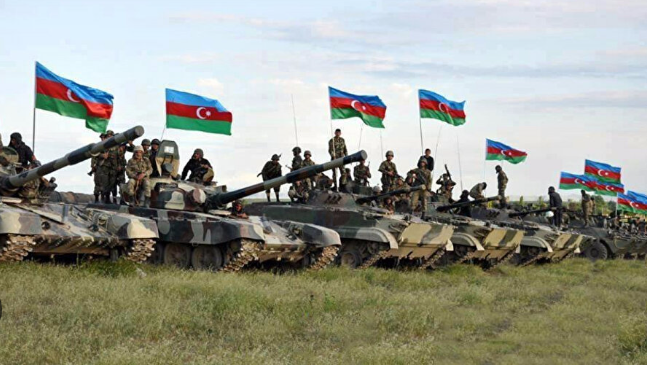Following the latest escalation on the border with Azerbaijan on February 12-13 that resulted in the deaths of four Armenian soldiers, Armenian Prime Minister Nikol Pashinyan has said he believes Baku is laying the groundwork for an invasion, according to Ani Avetisyan, reporting for EurasiaNet. Both sides accuse each other of gearing up for a new war. Iran is extremely alarmed by rising tensions. The focus of alleged Azerbaijan aggression is the Zangezur Corridor, a thin stirp of Armeni.an land which could connect Azerbaijan to its autonomous enclave Nakhichevan, thus opening a direct transport route to ally Turkey. Currently, trans-Caspian trade takes place through Iran, which is mindful of losing a lucrative commercial opportunity.
The latest incident saw Azerbaijan claim that its troops had come under fire from an Armenian army position in the southern Syunik region on February 12, resulting in the wounding of one Azerbaijani soldier. Armenia denied the accusation.
The following day Azerbaijan launched what it called a “revenge operation,” subjecting the same Armenian post to intensive fire for four hours and killing four soldiers and wounding another.
Azerbaijan’s Foreign Ministry reminded Pashinyan of “Armenia’s territorial claims on Azerbaijan.” This was a reference to Armenia’s Constitution, which – through referring to other documents – calls for the unification of the formerly Armenian-populated Nagorno-Karabakh region with Armenia. The process of changing the Armenian constitution has become a heated topic in both Armenia and Azerbaijan.
Peace talks come to a standstill
Azerbaijan’s demand that Armenia change its constitution has complicated the years-long process aimed at achieving a comprehensive peace deal between the archrival neighboring states.
Armenia must renounce claims against Azerbaijan, Azerbaijani Foreign Minister Jeyhun Bayramov repeated, at a meeting with US Assistant Secretary of State for European and Eurasian Affairs James O’Brien within the framework of the Munich Security Conference, Trend reports via the Foreign Ministry of Azerbaijan.
Azerbaijan demands the return of enclaves controlled by Armenia since the First Karabakh War in the early 1990s while Armenia demands the withdrawal of Azerbaijani troops from the Armenian territories it occupied between May 2021 and September 2022. Azerbaijan justifies its troops’ presence in the area due to the lack of demarcation and refuses to pull back.
What is at stake?
To deescalate the situation, Armenia proposed withdrawing troops from the border areas and establishing a demilitarized zone while the demarcation takes place. The West, including the European Union and the United States, supported Pashinyan’s proposal for demilitarizing the borders.
In his speech on February 15th, Pashinyan suggested conducting the delimitation process province by province. He also stated that Baku opposed this idea and that Azerbaijan has not changed its policy of military coercion. It’s a sharp contrast to two months ago, when the Armenian PM believed that Baku and Yerevan had agreed on the principles of a peace treaty and were close to signing it.
Since then disagreements have continued regarding who should mediate. Armenia tends to prefer Western facilitation while Azerbaijan would rather see Russia and Turkey in that role.
Speaking on February 14 while being inaugurated to his fifth term as Azerbaijan’s president, Ilham Aliyev said there should be no mediators in the peace talks.
Baku wants direct talks
“I think that the process of normalization of Azerbaijan-Armenia relations should be dropped from the international agenda. Because everyone seems to want to deal with this issue. Mind your own business!” Aliyev said.
In the same speech, he doubled down on his demand that Armenia change its constitution:
“Armenia and those supporting it militarily should understand that nothing can stop us. If territorial claims against us are not abandoned, if Armenia does not bring its legislation into order, of course, there will be no peace treaty. This once again suggests that building an army and strengthening military potential is the primary objective.”
The border violence and the escalating Azerbaijani rhetoric have exacerbated existing fears in Armenia of an Azerbaijani invasion. Specifically, there is apprehension that Baku will seek to use force to realize its demand for an extraterritorial corridor connecting mainland Azerbaijan with the Nakhichevan exclave.
The Zangezur Corridor: A New Chapter in Regional Connectivity
In the aftermath of the 2020 Nagorno-Karabakh conflict, Azerbaijan has pushed for the establishment of the Zangezur Corridor, a transport link connecting mainland Azerbaijan with its exclave of Nakhichevan via Armenian territory. This proposed corridor has raised concerns in Iran, as it could potentially shift the regional balance of power and provide Azerbaijan with greater access to markets in Turkey and Europe. Iranian officials have expressed reservations about the Zangezur Corridor, fearing that it could undermine their influence in the South Caucasus and lead to increased cooperation between Azerbaijan, Turkey, and Israel.
Iran alarmed
In response to the question of whether Iran’s position regarding the “Zangezur Corridor” has changed, Ambassador Extraordinary and Plenipotentiary Mehdi Sobhani of the Islamic Republic of Iran to the Republic of Armenia stated that the official position of the Islamic Republic of Iran is that the territorial integrity of regional countries should be respected.
Follow our English language YouTube videos @ REAL TURKEY: https://www.youtube.com/channel/UCKpFJB4GFiNkhmpVZQ_d9Rg
And content at Twitter: @AtillaEng
Facebook: Real Turkey Channel: https://www.facebook.com/realturkeychannel/
